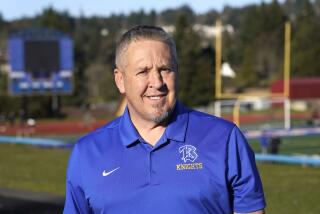Discoveries
- Share via
What’s God Got to Do With It?: Robert Ingersoll on Free Thought, Honest Talk & the Separation of Church & State; Edited by Tim Page; Steerforth Press: 138 pp., $10 paper
“WHAT this grand, gaudy, unapproachable country needs and lacks is an Ingersoll,” wrote H.L. Mencken, one of Robert Green Ingersoll’s many admirers in the 1920s. Mark Twain, Frederick Douglass, Elizabeth Cady Stanton and Oscar Wilde relied on and frequently quoted the noted orator.
Ingersoll, born in upstate New York in 1833, was a lawyer, sometime-politician and passionate speaker on the meaning of freedom, the equality of the sexes, the rights of children, the sheer beauty of the U.S. Constitution and the importance of keeping religion out of politics, writes editor Tim Page in his introduction to a new compilation of Ingersoll’s writings, “What’s God Got to Do With It?”
Ingersoll believed that the failure to “retire the gods from politics,” would be “an erosion of the secular principles set down by the Founding Fathers,” Page explains.
“The government of God has been tried,” wrote Ingersoll. “Theocracy was tried through the Middle Ages. God was the Governor -- the pope was his agent.... The result was that the noblest and best were in prisons, the greatest and grandest perished at the stake.”
Ingersoll sings the praises of poet Robert Burns and William Shakespeare in another famous sermon. He finds “the Pagans superior to the Patriarchs,” and he extols the virtues of Abraham Lincoln and Thomas Paine, whom he characterizes as true patriots and free thinkers.
He also condones, in a controversial lecture, the considered use of suicide. “What you get,” he writes of those who live “poor, little, mean, wasted, barren, weedy” lives, “depends upon what you are.”
Ingersoll’s ideas force a reader to reexamine the words freedom, liberty, truth and democracy. This little paperback, a far cry from the 12-volume collection of Ingersoll’s works, has the pleasant feeling of a morning spent listening to a lecture or sermon on a small-town green.
*
The Prophet of Dry Hill: Lessons From a Life in Nature; David Gessner; Beacon Press: 182 pp., $19.95
“PEOPLE who ignore nature feel something nagging at them,” the great American naturalist and author John Hay tells David Gessner in the new memoir, “The Prophet of Dry Hill.”
“Something missing, like a lost limb,” Hays says. “They think they can work out problems of salvation within themselves, but that is a hopeless quest. What we all need is something more than ourselves. And that is where nature comes in.”
Hay, spiritual descendant of Henry David Thoreau, Rachel Carson and Henry Beston, was 86 when Gessner, who lived just miles away on Cape Cod, recently conducted this series of interviews -- more like conversations really -- with him.
They talked about gannets and other seabirds, about Hay’s 60 years in the same house on Dry Hill, a mile from the ocean; about poet Conrad Aiken, who first lured Hay and his wife to the then-undeveloped Cape; about the sorry state of the Cape and people’s relationship to the land they live on; and about love.
Gessner, who at first is shy in his admiration for Hay, finds the author curmudgeonly, exuberant, “delighted and fierce and proper.” They talk about his early research on the lives of native Americans and about his eventual split from Aiken, who believed fervently in man’s superiority over nature, a view Hay could not share.
“Earth’s the right place for love,” Hay says, quoting Robert Frost as the two naturalists, old and young, walk among the poverty grass, lichen and peat of the Cape in winter, fall, summer and spring, looking for birds.
Hay also warns Gessner that the Cape is a “dying place,” referring to the overdevelopment that threatens the haven both call home.
And from Hay, Gessner tells us, he has learned not only how to see with the kind of patience and openness the naturalist is famous for, but also how to lead an “elemental life.”
More to Read
Sign up for our Book Club newsletter
Get the latest news, events and more from the Los Angeles Times Book Club, and help us get L.A. reading and talking.
You may occasionally receive promotional content from the Los Angeles Times.







